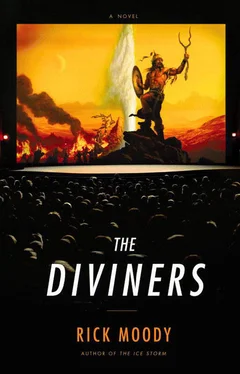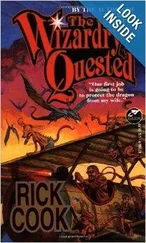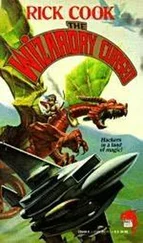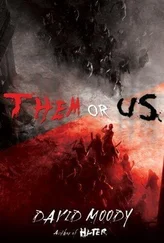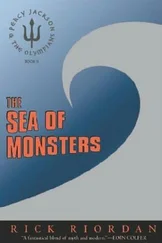The dispatcher sounds like the muezzin calling to the Muslims. Certain words are repeated. Thirty-one, thirty-one, JFK, thirty-one, two twenty-eight, pickup, Seventh Avenue, two twenty-eight. He fiddles with the volume on the radio so that it appears that he’s not listening to the telephone conversations in the backseat.
“I had to break the chain on the door. Just give it a good shove. I just leaned into the door some, gave it a good shove, and the chain came right out of the wall. I’ll spackle it. Anyway, then I walked right up to the bathroom door and I said, ‘I know you haven’t fed the cat. I know you’re lying to me. I can tell when you’re lying to me. What do you think it’s like to be lied to constantly? Do you think that’s pleasant?’ That’s what I said. She gets outraged, like it’s an invasion. She’s yelling that she needs some time to herself and will I please go away. The thing is, it smells pretty awful. I can tell even from out in the hall that there’s some kind of emergency going on in there. I just say, ‘Fuck it, Ma, I’m coming in,’ and the guy on the television is yammering about concession speeches, and the cat is yowling about wanting to get fed, and I force the bathroom door, and that’s when I saw the blood. ”
One drive he particularly likes: to Coney Island. He has a story about the roller coaster named the Cyclone. His wife, to whom he was engaged to be married when aged sixteen, according to the wishes of their parents, is always worried about their son. She is unnecessarily worried; she follows him about, keeping his hands out of things, because he has to put his hands on everything to feel what it is like. If there is rice pudding dessert on the countertop, as there sometimes is, his son must put his hands in the rice pudding dessert. He likes the texture of rice pudding. If there is curry or a korma or a biryani on the table, his son will attempt to put his hands in or on the dinner, before eating it, even if it should burn him. When there is rain, his son proceeds first through the door and into the street with his hands aloft, as if he wishes to catch rain. His wife takes their son to the school for other children who attempt to catch rain, and this school, because it is operated by the City of New York, is worthless, and though his son at one time had the possession of a few words, he is no longer using very many words, and his wife prefers that he stay in the house except when he is at the worthless school operated by the City of New York. His own beliefs are different. He believes that his son needs to be exposed to many things. His son needs to see the Statue of Liberty; his son needs to smell the herbs of the botanical garden and the animals of the zoo. When he is able, he sneaks his son to the cinema, where they see action films and sometimes Bollywood.
Then there is the amusement park called Coney Island. There is the boardwalk of Coney Island, there are the shouts of barkers at the playground, which are also like the calls of the muezzin, and there are the tastes and smells of the playground. He has journeyed to the playground of America. He has returned home to his wife, who is watching a television program about someone wishing to be a millionaire. To his wife, he says, “I want to take my son to Coney Island.” His wife objects, of course, to the trip to Coney Island. She says that their son is a learning-disabled boy, which is not a term that he cares to use. He prefers to think that his son is a sorcerer’s apprentice, so advanced in the studies of his craft that he has no time for the things of this world. His wife protests anew and then she breaks away from the conversation while attempting to guess the correct answer of the contestant who wishes to be a millionaire. She ridicules this contestant. Then she protests again.
Nevertheless, it’s his decision because he is the one spending twelve hours a day driving this car. And so it is decided. They will go to Coney Island, though his wife says that there are rules about who can ride. Here’s how they go: via the Brooklyn-Queens Expressway, to the Gowanus, to the Belt Parkway, to Ocean Parkway, and they park their Chevrolet sedan to unload the women in their salwar kameez, his wife and her cousins, so that they might walk along the boardwalk. What a day. Sparkling. It is glorious for every person who lives there, no matter where he comes from, whether he comes from the steppes of Central Asia, or the desert of the Middle East, or the jungles of Africa, or the rain forests of South America. The bridges, the Statue of Liberty, the view of New Jersey, where his cousins live, this is glorious. The sea is glorious. The open water is glorious. They shoot plastic rifles at plastic ducks, and he gives his son a key chain with a Bengali tiger on it. They eat the snack called french fries. His son has an abiding need to put french fries into the mouths of everyone present. Even some strangers are willing to have these french fries put into their mouths.
And then when the moment is right, and the sun at its zenith, they begin to make their way toward the Cyclone. His wife says, “No, no! Not on that thing!” But he does not pay attention to her imprecations. The ticket booth is before them, and he hears the cries of riders of the Cyclone hurtling through space. The man in the ticket booth is weathered from his many years at the Cyclone, such that he looks like one of the seagulls of the Coney Island boardwalk, which are so gray and so fat and so nasty that you cannot pause from putting a morsel of food into your mouth, unless a seagull should take it from you. His son has recently learned this painful lesson.
“Excuse me, sir, is it possible that I may bring with me my boy here, onto the ride?” Pointing to his son, whose beatific expression is marred only by the strands of drool and by his squashed features. The man in the booth of the roller coaster called the Cyclone cannot be bothered with the semantic categories of intelligence. He has seen it all before. He has seen the riders with no arms; he has seen the riders with withered legs. He has seen blind persons, who fold up their canes and remove their sunglasses. He has seen it all, an ebbing and flowing of physiques. Into this door, America goes, and pays for its ticket, and from this one America emerges, wobbly in the knees — if it still has knees. The man in the booth waves his hand in a dismissive way, as if to say that the roller coaster is no discriminator of intelligence. Only size matters, just size, and his son is now fifteen years old, and he is interested in many kinds of mischief with regard to his bodily secretions, but there is no disputing he is large enough for the ride. “Excuse me, sir, but now I thank you. It’s a momentous day, sir, on which you should treat my son with respect, because he represents the renewal of blessings upon this country. Thank you for your consideration.” The man in the booth spits into a paper cup.
He could go further, of course. He could speak of the Indus River civilization; he could speak of the millennia of accomplishment on the part of the Vedic Aryan civilizations, of Graeco-Bactrian art, a thousand years before that Jewish woodworker ever got his failed business going in the city of Jerusalem. He could speak of Mongol invasions, British occupations, of the Civil War, of Jinnah and Nehru and Gandhi, of his own father, a shopkeeper, in the rioting, of his father’s uprooting of the family from what is now Pakistan, where it was said that a Sikh family could no longer be safe. He could speak of the Sikh emigration, of its scattering, of the Punjab and its ferment, of the Sikh tendency, at least in his family, toward restlessness. He could speak of coming here, of always knowing he was going to come here one day, for the boy, so that the boy could ride this roller coaster, so that the boy could know these things that his father did not know when he was getting concussed on the streets of Delhi. Yet he says nothing. He smiles, and he leads the boy and the women up through the maze to the tracks of the Cyclone. Here is the car of the roller coaster disgorging itself of a dozen teenagers. He and his son take up position in the frontmost car, and the jaded operators of the roller coaster pull fast the restraining bar, and his son is speaking the strange clicking language that he favors, which sounds like an exotic African tongue, and then there is the sound of the chains dragging the car of the roller coaster toward that first summit, and all the women in the back are screaming, and his son is seeing Shiva the destroyer.
Читать дальше
